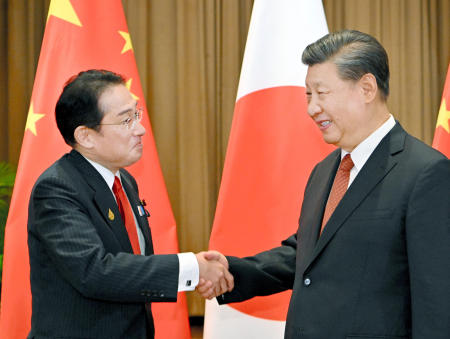
- ARAB NEWS
- 26 Apr 2024

BANGKOK: Japanese Prime Minister KISHIDA Fumio expressed grave concern about Chinese government ships repeatedly entering Japanese waters around the Senkaku Islands, which are at the center of bilateral tension, at a summit with Chinese President Xi Jinping on Thursday.
Speaking to reporters after the summit in Bangkok, Kishida revealed that he also voiced serious concern about China’s military activities, including the firing of ballistic missiles at around Taiwan, and reiterated the importance of peace and stability in the Taiwan Strait.
Meanwhile, Kishida and Xi shared the views that Russia’s threat to use nuclear weapons in Ukraine is a source of extreme concern and that such weapons must not be used.
The Kishida-Xi meeting was the first face-to-face meeting between the two countries’ leaders since December 2019, before Kishida took office in October last year.
The 45-minute meeting was also attended by Foreign Minister Yoshimasa Hayashi and Economy, Trade and Industry Minister Yasutoshi Nishimura from Japan, as well as Chinese State Councilor and Foreign Minister Wang Yi.
The summit took place at a time when China is repeatedly sending its government ships to waters around the Senkaku Islands in the southernmost Japan prefecture of Okinawa, while ramping up military pressure on Taiwan.
At the outset of the meeting, Kishida noted that Japan and China are both major powers with great responsibility for peace and prosperity in the international community. He stressed that it is important for the two countries to spur efforts to build a constructive and stable bilateral relationship.
This year, the two countries mark the 50th anniversary of the normalization of their diplomatic ties. But until the Bangkok summit, Kishida and Xi had not held talks since they had talks over the phone just after Kishida became prime minister last year.
At the summit, Xi told Kishida that the importance of the China-Japan relationship has not changed, and that he hopes to improve the bilateral relationship from a strategic perspective and make it meet the call of the new era.
Kishida conveyed to Xi grave concern while referring to a Chinese ballistic missile that fell into waters within Japan’s exclusive economic zone during China’s military exercise around Taiwan in August.
On the Taiwan issue, Xi said that intervening in China’s domestic affairs is unacceptable for any reasons.
As for the Senkaku Islands, which are also claimed by China, the president said differences of opinion should be managed appropriately with political wisdom and responsibility.
Meanwhile, the two leaders agreed to strengthen communication in the security field, such as implementing promptly a hotline under the maritime and aerial communication mechanism between the two countries’ defense authorities.
They also confirmed the continuation of dialogue between their countries, including at the summit level.
Over North Korea’s nuclear and missile development, Kishida expressed serious concern while showing hope that China will fulfill its role on the matter.
Kishida and Xi affirmed close cooperation to resolve the issue of Japanese abductees in North Korea.
The Japanese leader also took up human rights issues in China and expressed Japan’s position. On climate change and development finance, he called on China to act based on international law.
JIJI Press